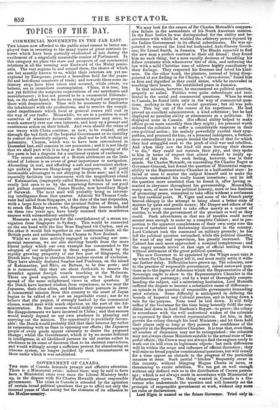TOPICS OF THE DAY.
COMMERCIAL MOVEMENTS IN THE FAR EAST. THE leisure now afforded to the public mind cannot be better em- ployed than in reverting to the many topics of great intrinsic in- terest which have been partially overlooked of late during the excitement of a singularly memorable session of Parliament. In this category we place the state and prospects of our commercial relations in all the teeming seas Eastward of the Malay penin- sula. The vast regions in and around them, the shores of which are but scantily known to us, whilst their interiors are yet un- explored by Europeans, present a boundless field for the peace- ful and beneficent conquests of trade; and towards these some in- itiatory steps have been taken and secured, while others, we believe, are in immediate contemplation. China, it is true, has not yet fulfilled the sanguine expectations of our merchants and manufacturers ; it has not proved to be a commercial Eldorado : but, on the other hand, we have no reason to regard our prospects there with despondency. Time will be necessary to familiarize the inhabitants with our productions, and to remove the compli- cated impediments which local or general causes still cast in the way of our traffic. Meanwhile, we are in a position to avail ourselves of whatever favourable circumstances may arise, to watch narrowly over our own interests, and keep up a prompt and continuous action on their behalf. And even should the terms of our treaty with China continue, as now, to be evaded, either through the bad faith of the Imperial Government or its inability to control its disorderly subjects, we shall not be left without an indemnity. Chusan, which was to have been surrendered in December last, still remains in our possession ; and it is not likely that we shall part with it so long as the nominal opening of the five porta is but a disguise for a continued system of exclusion.
The recent establishment of a British settlement on the little island of Labuan is an event of great importance to navigation. Abounding in coal, and affording a safe and convenient anchor- age midway between Hong-kong and Singapore, it will yield inestimable advantages to our shipping in those seas; and it will especially facilitate our intercourse with the magnificent island of Kalamantan, (improperly called Borneo,) which has been re- cently laid open to us by the surprising fortunes of our good and gallant countryman, James Brooke, now hereditary Rajah of Sarawak. The next mail will probably bring us interest- ing intelligence from that quarter. Admiral Sir Thomas Coch- rane had sailed from Singapore, at the date of the last despatches, with a large force to chastise the piratical Sultan of Bruni, and to crush the Malay rovers, who, forgetting the lessons inflicted on them two years ago, have lately resumed their murderous courses with extraordinary audacity.
Measures are in progress for the establishment of a steam na- vigation from Singapore to Sydney. This would be connected on the one hand with the line from England viii Ceylon, and on the other it would link together in one continuous chain all the British ports and settlements from Chusan to New Zealand. While we are thus actively engaged in extending our com- mercial resources, we are also deriving benefit from the more liberal policy which our own example has commended to the adoption of our neighbours in those regions. Struck by the rapidly growing prosperity of our free port of Singapore, the Dutch have begun to abandon their jealous system of exclusion. They have already declared Sambas and Pontrana, on the island of Kalamantan, and Rhio, on Battam, to be free ports ; and it is rumoured, that they are about forthwith to remove the interdict against foreign vessels touching at the Moluccas. These are good auguries, and encourage us to look for the spread of the same enlightened views in other quarters. If the Dutch have learned wisdom from experience, so too may the Japanese, their close allies, and hitherto their partners in error. A commercial mission from this country to the court of Japan begins to be talked of as not an improbable event ; nor do we believe that the project, if strongly backed by the commercial classes, would meet with much objection on the part of the Ad- ministration. Its final success would richly compensate us for the disappointments we have incurred in China ; and that success would mainly depend on our own prudence in planning and carrying out the mission. The opportunity is peculiarly favour- able : the Dutch would probably find that their interest lay rather in cooperating with us than in opposing our efforts ; the Japanese people of every grade appear earnestly to desire the proposed change ; whilst the Government, which is by no means deficient in intelligence, in all likelihood pursues its old routine rather in obedience to its sense of decorum than to its abstract convictions, and would willingly accept a sufficient pretext for abandoning an irksome system, no longer justified by such circumstances as those under which it was established.


























 Previous page
Previous page